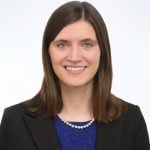In conversation
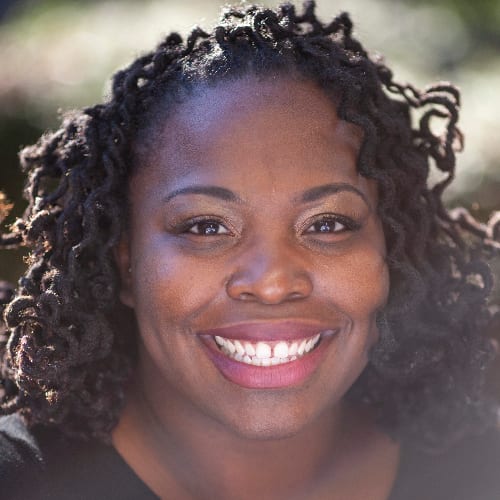 Bridget Blount
Bridget Blount
Senior director of data initiatives, Baltimore’s Promise
Learn more about Bridget >>
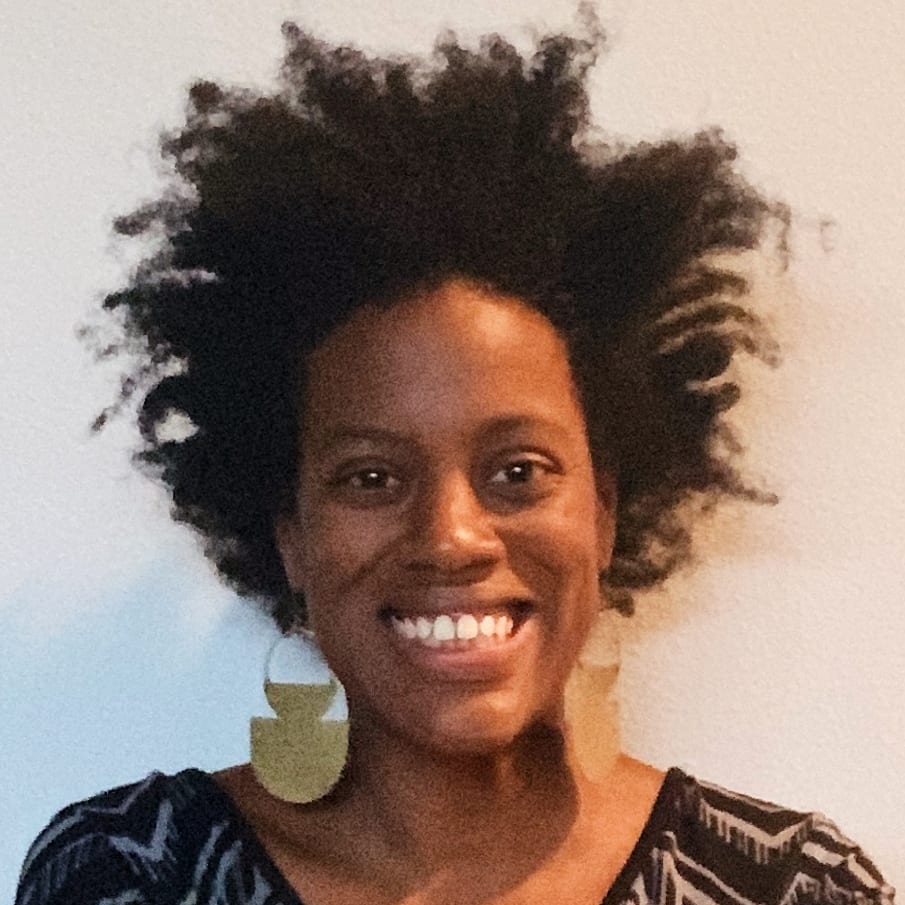 Bernadette Merikle
Bernadette Merikle
Executive director, Community Center for Education Results
Learn more about Bernadette >>
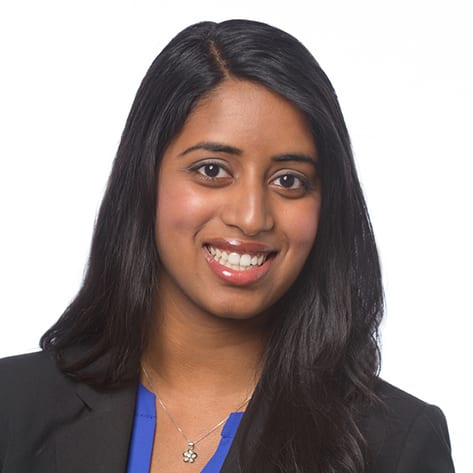 Parvathi Santhosh-Kumar
Parvathi Santhosh-Kumar
Vice president of equitable results, StriveTogether
Host
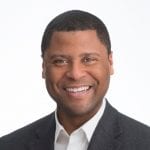 Christian Motley
Christian Motley
Senior manager of policy and partnerships, StriveTogether
Transcript
Christian Motley, senior manager of policy and partnerships, StriveTogether
[00:15] Hi, I’m Christian Motley from StriveTogether, your host of Together for Change, where we shed light on what’s possible in creating an equitable recovery. Today we will examine equitable recovery through the lens of community authority, racial and ethnic equity. We will explore why it’s important to shift power to Black, Indigenous, Latinx and Asian youth and families.
Joining me are Bridget Blount, the senior director of data initiatives for Baltimore’s Promise; Bernadette Merikle, the executive director of the Community Center for Education Results, which supports Road Map Project and South King County. Parv Santhosh-Kumar, vice president of equitable results at StriveTogether, also joins us.
Baltimore’s Promise and the Roadmap project are members of the StriveTogether Cradle to Career Network. This national network of 70 community spans 30 states and Washington DC. Together, we’ve impacted the lives of more than 12 million young people last year, including more than six million children of color. Let’s get started. Parv, what is community authority? And why is shifting power important for an equitable recovery?
Parvathi Santhosh-Kumar, vice president, equitable results, StriveTogether
[01:17] Yeah, when we talk about community authority, or community co-development of solutions, what we’re really talking about is the practice of making decisions and developing strategies in partnership with youth, families and community members that are most impacted by the inequities that we see in our systems. It’s really in the spirit of “Nothing about us without us.” We believe that community members with lived experience have the insights, the assets and the agency needed to transform racist systems and chart a course to a more equitable and just future. So, as we think about our definition of systems transformation, we see shifting power is one key component of that. And that’s our North Star for cradle-to-career partnerships across the country.
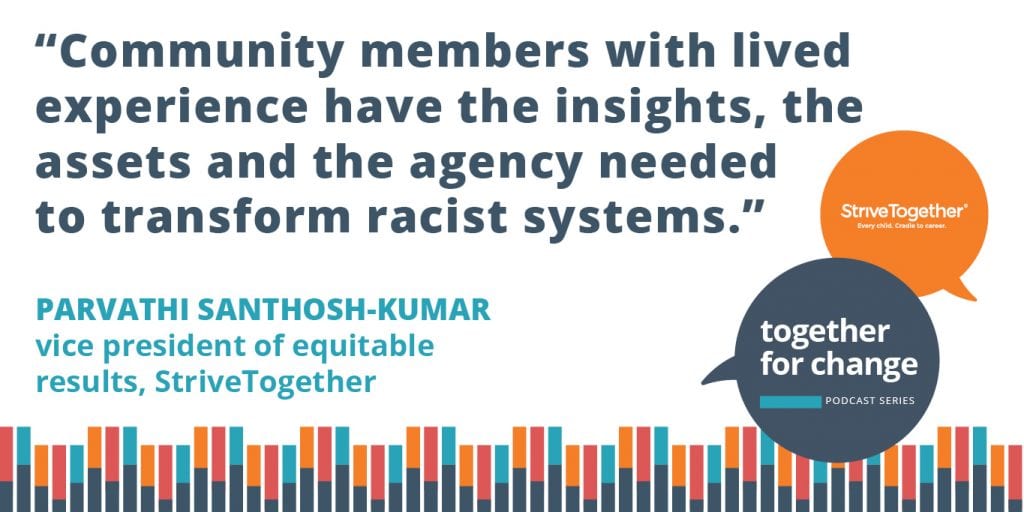
Christian Motley
[02:03] Thank you, Parv. Bernadette, with that as the backdrop, I wonder if you can tell us a little bit about your work and your community there in South King County? And what community authority looks like where you are? What’s working, what are you learning?
Bernadette Merikle, executive director, Community Center for Education Results
[02:17] For sure. So, at the Community Center for Education Results, we partner with all of the partners in the Road Map Project, in order to really center community in ways that they haven’t really been centered before. And so, as a new ED, I’ve come in asking the most basic of questions: what does community mean?
And it’s really interesting, the different answers you’ll get for that, depending on the vantage points that people sit and come walk into the meeting with. And so, for us, we’re always looking for ways that we can start with the youth that we are serving, be they certainly the youth that are transitioning from high school to college is a really big part. But as an organization that is really looking at the whole pipeline, we believe that even our elementary-age students have plenty of space and agency to tell us what it is that they think works in their community.
[03:22] So, in our region, where we serve seven King County, Washington, school districts — Auburn, Federal Way, Highline, Kent, Renton, the south part of the Seattle School District and Tukwila — this looks like a really concrete example where we worked in partnership with opportunity youth who are 16 to 24 years old, and have been pushed out of the traditional education system. We worked in partnership with them to have them design, develop, deploy, analyze and get out into the world a survey around what COVID needs were for students in our region.
And it was a really fantastic opportunity. One, for us to really be in right relationship with students and trust that they knew what the questions that needed to be asked. And that they knew how they wanted to structure the analysis and what came out of those surveys in ways that centered their communities, talked about the opportunities ahead and talked about challenges in ways that were really loving and very much in line with our belief that our communities have all the answers that they need to the issues that plagues them, including COVID. And it was just such a beautiful experience to be able to work with students so deeply like that.
Parvathi Santhosh-Kumar
[04:50] That’s an awesome example. Thanks so much for sharing that.
Christian Motley
[04:53] Bernadette, given what you shared, I just wonder — that is such a great example of community taking up the authority that really exists from them and I wonder, what are challenges? What did you learn about what it takes to really embed that into your everyday work?
Bernadette Merikle
[05:14] Yeah, a really entrenched challenge to leading with trust of our community is that that’s just not the way the system is set up. And so, we’ve had students, in another scenario — certainly before the global pandemic in regards to COVID but definitely after George Floyd’s murder — go to their school districts organized space to say, “This is what we need to be successful in your system.”
And so in Seattle in particular, and particularly in the school districts we work in, we’ve had lots of different petitions that have been circulated around removing school resource officers from schools. And so it’s part and parcel of our community’s demands that we defund the police and policing systems that show up in schools and are predicated in this space of making people feel safe, like, “Oh, we’re going into this community, and so having that police presence makes us feel safe,” and actually asking the question of like, whose safety is being prioritized. And at what cost. If we have students who are feeling terrorized in their schools are feeling like, “Oh, I’m constantly under a police state, because of who I am,” then that’s not a really great learning environment for them.
[06:37] And so a really big challenge is that students have started those petitions, they’ve gone to their school district and school boards and said, from a very local-based space, “We want the SROs out of our schools, and we want more ethnic studies classes.” And in almost all of those cases, people will make space for students to show up at their meeting.
But then there’s no follow through, or there’s no action. And if there is, that action is often in a way that takes an interpretation of what students were saying or twists even what their words were into the space of “We’re the adults, we know better. We’re the funders, we know better. We’re someone other than the community, and we know what’s best for you.” And so that can be really frustrating for the students that get mobilized and activated to come up against those kinds of walls over and over again.
[07:32] For us, what we’ve learned is that when we’re working with our students, we have to ask ourselves a really potent question around what is our job as a collective impact entity in this work? Is it our job to go and gather the knowledge from the community and then come in, you know, clean it up and make it a certain way, so that we can go to those that are resourced in our community and say, “This is what they need,” and then go bring it back to them as that bridge intermediary? Is it our role to train up our students, our parents, our community to go and be able to go to a school board meeting and be like, “Here are the rules, this is what you need to do. This is how you’re going to be heard.”
Those are some really pressing spaces that I think lots of organizations play the role of either as advocate or as trainer of community. But for CCER, I think, and particularly in The Road Map Project, where we live in a region that at least espouses a really strong commitment to doing anti-racist work and doing work in anti-racist ways, and being able to hold us accountable to those values — I believe it’s our work to do a third way, which is working as part of the system and in partnership with the system to get the system ready for the community.
[08:55] It’s not for us to like train students on how to like, get their soundbite in front of the city council or the school board. But for us to work with the city council and the school board to be like, “The community knows. This is how you trust them. This is how you actually follow through on what they say and establish loving, right relationships with community,” which is something they really want to do but feel stuck in knowing how to do that.
Christian Motley
[09:23] Thank you, Bernadette. Thinking about your statement about bringing young people to the table, for example, and not having follow through. And I think this is like the worst thing that can happen, right? It’s like, you bring community to the table and don’t follow it with the investment in their ideas or commitment to what you said you would do.
I think we heard this in both San Antonio, our partnership UP Partnership, and in Minnesota, where the Education Partnership Coalition has been working particularly around policy. There had initially been, I think, a lot of work to prepare young leaders and prepare parent leaders. And I think one of the learnings that we that we took from their work is how important it is to prepare the system to engage with them. There’s no fixing that needs to be done to community members. It’s the systems that have to be prepared to adjust and have open lines of communication. And to be prepared to again, as you said before, you know, follow through and keep action commitments. Parv?
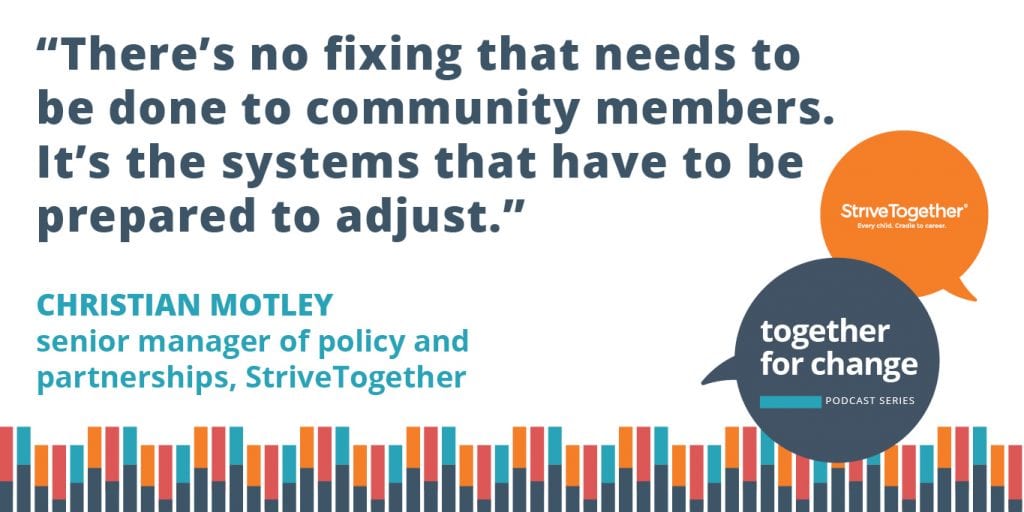
Parvathi Santhosh-Kumar
[10:33] Exactly. I just got excited about that idea, Christian, that Bernadette was talking about — that this narrative shift and this framing pivot is so powerful about getting systems ready for community instead of the other way around. And in partnership with that notion of whose safety are we reprioritizing, I often have heard Bernadette say this powerful question: do you love Black people more than you hate white supremist systems? And pairing that question with this what-if question of “What if we designed systems around a young black girl instead of an upper-middle class white boy?” And that’s what systems transformation is about.
Christian Motley
[11:11] I appreciate that. I’m wondering, Parv — and I see right now that Bernadette and Parv are going to make me, they’re going to have me ready to go to work after this conversation. But, you know, through this podcast, you know, listeners have gotten the chance to know a couple different folks on our team and learn a little bit more about the work that StriveTogether does. I wonder, can you talk a little bit about how we coach and support communities as they’re doing the important work that Bernadette and the team and the community in South King County is doing?
Parvathi Santhosh-Kumar
[11:43] Yeah, definitely. The need to transform systems and provide support to create this more equitable future has never felt more urgent. I mean, we’re facing the continued brunt of the COVID-19 pandemic on Black, Indigenous, Latinx and Asian communities. The recent killings of Black people have sparked this more public outcry about the reality of racial and justices that were built into our systems and compounded over time. And the data and facts are clear that communities are situated differently in relation to well-being and opportunity, and that our current systems and structures are not designed for people of color in this country.
At StriveTogether, our vision is about every child, cradle to career. And if we truly mean “every” when we hold that vision of the success of every child, cradle to career, we have to be explicit and overt about shifting power policies, practices and resources to Black, Indigenous, Latinx and Asian youth and families.
[12:42] So holding that frame of the “why,” at StriveTogether, we focus our coaching and support to help communities and these cross-sector partnerships, like Baltimore’s Promise and the Road Map Project, work to center racial and ethnic equity in every aspect of the work. So, it’s not a one-size-fits-all Band-Aid solution. This is about a whole host of strategies.
It’s about increasing the participation and leadership of Black, Indigenous and people of color in the work. It’s about changing policies that perpetuate oppressive systems. It’s about using disaggregated data to identify who is furthest from opportunity. And it’s about practicing targeted universalism, to really pay particular attention to which are the groups that are furthest from opportunity, and what are the strategies and solutions that we can do and create in communities working with and in partnership with youth and families rather than working for them.
Christian Motley
[13:35] Bridget, I want to get you in this conversation. You know, we’ve been talking about community authority and the example about young people being engaged in decision making came up. And I want to see — first, tell us a little bit about Baltimore’s Promise and the context you all are working with working. Could you talk particularly about the strategies around engaging youth in decision making?
Bridget Blount
[13:56] Baltimore is a tale of two cities. We are comprised of about 65% of people who identify as Black. And if you were to ever take a look at a map of Baltimore, you would be able to clearly see a history of race-based policies such as redlining, gentrification and disinvestment. For some our city is the land of opportunity. Our city has recently experienced a major investment and development, particularly in our downtown areas, and communities already rich in resources. New businesses focused on warehousing and tech startups are popping up all across Baltimore and the surrounding areas.
And while there’s a steady bustle of investment and development in some Baltimore neighborhoods, in other neighborhoods, particularly those with high concentrations of Black and brown people, they continue to face disenfranchisement and lack of investment. Black and brown young people graduating high school here in Baltimore have to work so much harder to gain access to these new job opportunities being created. However, due to rampant structural and institutional inequities, our young people and many people from low-income communities do not have the same access to the individuals and networks that provide a pathway to these new job opportunities.
[15:09] In addition to these barriers, we have found as an organization looking at the data that most of our high school seniors, though so strong and resilient, are graduating from city schools with reading and math proficiency levels at middle school levels or below — levels that are not high enough to meet basic job requirements for job opportunities that would offer them a living wage. So my city, Baltimore, is a beautiful and cultural rich city of about 600,000 residents filled with opportunities and people ready to figure out how to make lasting change by creating new spaces that benefit both new development, as well as community ownership and not further displacement and harm of vulnerable communities.
Christian Motley
[15:51] Why do you think it’s been so important to engage young people?
Bridget Blount
[15:54] We believe to create effective interventions, it is necessary to engage youth as assets and co-developers in a decision making process regarding the initiatives that have a direct impact on them and the communities in which they live. This also includes having youth look at the data in which they are represented and tell us about the stories and experiences behind the data from their perspective, as well as the root causes of their data and their opinions.
[16:19] This sets us up for a more effective path as we begin to think about developing interventions and system change efforts in partnership with young people. Oftentimes, when we think about engaging youth and community in general, we typically go to them once decisions have already been made to inform them on what steps will be taken to address community issues rather than bringing them in from the beginning to appropriately identify what the problem is, and to help co-develop solutions. What happens is authentic youth and community experiences are not accurately reflected in the policies and solutions identified. And that is why we do not see lasting transformational change.
Authentic youth and engage youth engagement requires that young people are actually have authority and responsibility throughout the process as well as opportunities to develop the skills needed to make sound decisions. This means working as partners with youth in a way that recognizes them as equal decisionmakers and provides them with access to leadership opportunities rather than token participation. There are several ways that Baltimore’s Promise engage and support young people while sharing or entrusting decision-making power to young people on matters directly concerning their well-being.
[17:33] One strategy that we’ve used, and we’ve used this several times now, is to include them in the proposal review process following a request for a proposal. We have structured developmentally appropriate ways so that young people can review proposals from organization requesting funding from or consultants that are seeking to lead research and strategy development in relation to improving youth outcomes.
For example, one of our initiatives called Grads2Careers that we run jointly with the mayor’s office for employment development and Baltimore City Public Schools, we recently closed an RFQ to identify occupational skills training programs in the fields of IT and computer programming. We are working for organizations that can — we were looking for organizations that can recruit and enroll young people that will provide them with job training and support them afterwards and finding a job.
[18:30] So what we had young people do is score the proposals against a rubric and provide comments on whether or not they felt like this program will be successful in supporting them in their journey. And afterwards, we met — we had a consensus meeting where we met with them, and to kind of understand what was their thinking, and to really make a decision on which program we should fund.
All youth participating in any engagement activity with Baltimore’s Promise receive a compensation for their time. This is not because we are being polite. This is because we understand youth are expert consultants on the lived experiences of young people in Baltimore, and we are not only paying them for their time, but also for their expertise. In addition to our care and practice of engaging young people to help decide which programs to fund reviewing proposals, we are taking that a step further and developing a youth-led COVID-19 grant-making strategy.
Christian Motley
[19:30] And yeah, one more question I think that this begs — I think it goes for Bernadette in South King County as well. We know it’s important to engage young people. We know that we have to engage across the community as partners, as equal partners at the table. But I think a part of that is also knowledge. And I just wonder how are you equipping young people when they when they come to the table to be able to have those conversations? How are you supporting them?
Bernadette Merikle
[20:04] Well, I think that there’s a fundamental belief shift for us where it’s really easy, particularly in our region where — up here in the Pacific Northwest, we have extreme and incredible wealth. And so the poverty that is juxtaposed to that seems like a bigger gap. We have highly educated by like college means folks here. And so for us, shifting the paradigm from like, that is the supreme way of knowing, you have the degrees, you have the wealth, to the everyday lived experience, language, ways of talking about that experience, ways of knowing about that experience, are just as valuable, if not more valuable, especially if you’re trying to do stuff in partnership or even on behalf of that community.
And so while we don’t partake in, like, throwing students to the wolves, or even their parents — we have a really strong parents program that helps to educate parents — but particularly when we’re talking about students who are the center core of the community we talk about when we say community, we partner with other organizations like SOAR in our region, who have their own youth councils and do a lot of the work around making sure that students, their preparedness is more about their confidence more than their content or how they speak.
[21:32] And so, making sure that they’re basically hyped up and psyched up to know that like, what you have to say as youth is valuable and valid in the way that you want to say it. And making sure that they know that they can show up places and there are lots of organizations with quote-unquote clout that will have their back for them going and speaking their passions with their passions.
So, for us CCER, specifically, we don’t subscribe to the notion that like students need to be kind of trained up to be able to go and speak their experience. We believe that the people that they’re going to go speak that experience to are the ones who need to be trained up in how to be in right relationship with those communities.
[22:20] And so, a lot of that work is around us making sure that how we ask questions in our research and how we report results in that research is starting to shift so that we can center the voices of our community. And again, community very explicitly being defined as the youth we are trying to serve. And have those folks be the experts from which our superintendents, our principals or teachers are learning from and being in authentic relationship with.
Christian Motley
[22:54] Bernadette, I appreciate you framing that in that way. You know, I didn’t even like the way I asked the question, you know. What I think I was trying to get at is, we talk about numbers and narrative are important. And sometimes the conversation is framed such that, you know, the data is king, the numbers are king. When really, you know, without having — I think Parv said it before, “No discussions about us without us,” — having the lived experience as a part of that data and evidence, I think is just really important.
I think what I was trying to get to, as I’m thinking about, just like the tools and supports that you all kind of bring to bear in your work. And Bridget, I know that you all have been working with data in a way that has really been able to support your focus on equity. Could you talk a little bit about that tool, that resource?
Bridget Blount
[23:45] So, Baltimore’s Promise is working on developing an integrated data system for Baltimore. And that utilizes a racial equity approach with an intentional structure for a community oversight and ownership of the data process. Because too often when we begin the process to analyze data, we do not include engagement with individuals represented within the data. So for our organization, it is important that we partner with community and key stakeholders throughout participatory approaches to help contextualize the data, the resulting interpretations of that data and ultimately the policy and strategy recommendations that are made.
Partnering with community and equity advocates to interrogate the data through actions such as data walks and conversations about the data quality, the data quality issues, really help make the process much more rich. And then it helps us to understand better what questions need to be asked. We often do not completely understand the whole picture, and that is why it is imperative from the beginning that we are partnering with community and those that are most impacted by the issues being addressed to identify the agenda priorities, as well as through the interpretation of findings and determinations of what steps are recommended next.
Christian Motley
[25:03] Thank you, Bridget. We’re talking about, you know, our conversation is within the context of these twin pandemics that we’re facing. And Bernadette, I know you spoke to the death of George Floyd and the work that came after. I just wonder — I want to put a point on and just ask very specifically about the impact of, you know, this public health crisis. And really this crisis of racial injustice.
What has been the impact of your communities and how have your residents in your communities, those folks most impacted, been able to inform decision making or participate in the discussions that are happening community wide?
Bernadette Merikle
[25:40] Yeah, here in Seattle, I think it’s such a great question and a pressing space around what does it mean to be kind of one of those backbone, collective impact organizations that as I was talking to earlier, right, like, I don’t think our work is to be advocate on behalf of, or even to train our community to like, “This is how you go to city council” — our community knows. For those who are not familiar, Seattle had one of the, we had our first black femme police chief just resign over “Defund the police’ and the city council engagements around budget and what that means.
And one of the things we live with a lot at our organization, which is undergoing its own transitions of having a lot of between — myself and the senior directors and who is on staff at CCER — we’re transitioning to be people of color-led, and particularly Black-led in our space.
[26:46] And so the tensions we’re holding between like, a system of policing that we don’t believe in that we know is harming our students being dismantled and being dismantled in front of our eyes, while also being like, oh, but Police Chief (Carmen) Best was one of us. And so, what’s the fallout from that?
The reality is that trusting community, particularly those of us in power, trusting community to know their solutions is — I’m a gardener. So, it’s muddy, messy work. And to me, that’s delicious and beautiful. I don’t know that it was strategic, that the folks who were marching in the streets and demanding that we defund the police were like, “Okay, and step 17 is that we’ll have the police chief resign” or anything like that. But it is definitely a consequence of the work that we’re doing. And when I use the word consequence, I mean it more in it is consequential, not so much that it’s a negative or bad thing.
[27:46] But that’s what happens when we trust community to know what they need, and to put us in discomfort over not being the experts. And so, to that point of, like, what are frameworks and tools that we use with students, again, I would just flip the narrative in that space, and that the tools and frameworks that we use at CCER are more so, again, in as partnership with the system that we want to dismantle, it’s getting that system to be ready for that discomfort and the shockwaves of not knowing exactly what’s going to happen.
And I think that both the COVID pandemic and George Floyd’s murder, and the outrage that was the letting out of rage in literally in the streets around that just highlighted stuff that we had been working on for a long time, because our community had known and had experienced for a long time that these are the things. One day we say that it’s too expensive. We need 10 years to get to one-to-one devices for students in a district. And then the very next day, we have COVID happen and people need to stay home. And all of a sudden, we find all the resources to make sure that everybody has a one-to-one device.
[29:11] And so, it’s not a question of resources. It’s not a question even of knowledge. It’s not even a question of power. It’s a question of will and courage, and our communities have will and courage in spades.
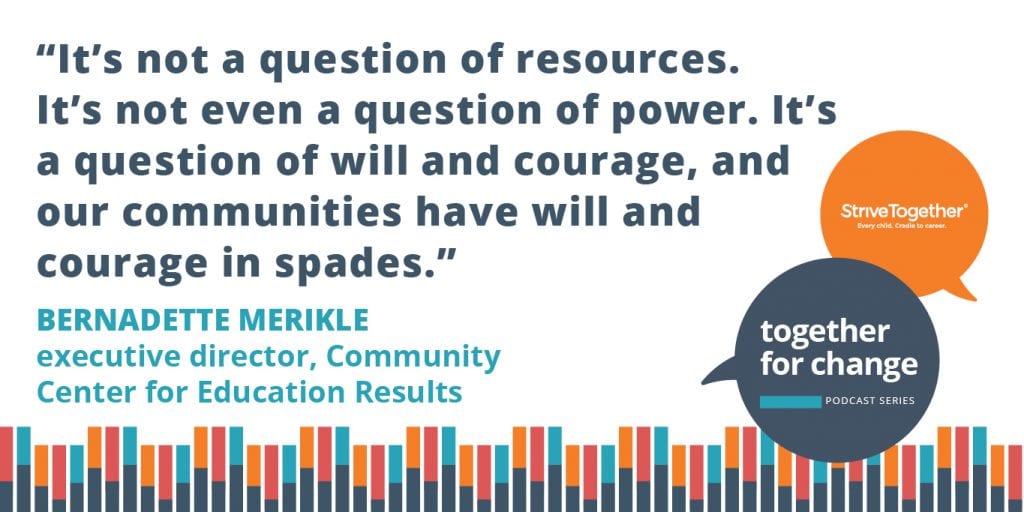
And that’s what I’ve seen from both of these pandemics really show out, is that people who —and I count myself in this as part of the system, people who are like, “Well, maybe we need to go a little bit slower, maybe we’re not quite ready for that level of disruption,” are not only being asked to, not even asking others to, but we’re being forced to take a backseat to like people who have had the will and courage all their lives through all of their lived experiences, to say, “This system doesn’t work for me. And why should I have to, like, come up with the perfect replacement system when we don’t demand perfection of the system that currently exists.”
[30:10] So let’s put our values on the line and let’s get out there and make sure that our students and the ripples out from them, their parents, their teachers and principals and superintendents, the funders, like all of those folks, taking cues from the people whose lives they’re trying to impact is something that has been a beautiful consequential experience of both COVID and George Floyd and so many others, not even just George Floyd’s, but the murders that have been happening in these streets.
Christian Motley
[30:41] Certainly. And thank you, Bernadette. Bridget, for you. Same question. I mean, what has been the impact of these twin pandemics, the public health crisis and racial injustice, and how is the community taking up authority and how are you supporting them?
Bridget Blount
[30:59] Many may know, or maybe may remember that in 2015, Baltimore experienced a similar time of uprising with the death, when Freddie Gray died due to injury suffered while in custody of the police department.
Since that time, over the past five years, there has been so much intentional work done across our city by some amazing nonprofit and community activists to rebuild in a way that has created better relationships between the community and Baltimore City Police Department. And while there’s much work left to be done, we really took pride here in Baltimore, took pride in our response to the murder of George Floyd, a public response that was very much led by young people and youth activists in Baltimore City.
[31:46] We were determined this time around, we would take the intentional effort to do the work, the learning and healing over the past five years, that we would take everything that we’ve learned over the past five years, and direct our angst and anger through protests, but not in a way that led to the destruction of the homes and businesses in our community. Our activist was very, very, very determined that we would actually utilize our collective strength and learning in a way to be national representatives of how to do peaceful protest, and to show some of the work that we’ve done over the past five years. There are so many great organizations out there in our city working with communities and systems to do this work, and they deserve a lot of the credit.
[32:33] In response to the COVID-19 pandemic, Baltimore’s Promise acted as a backbone support for a group of funders that were interested in getting funding out to nonprofits providing direct support to other nonprofits supporting community members. So the Greater Baltimore COVID-19 Collaborative was, it was a streamlined application process. And through the collaborative, we were able to administer $4.8 million to organizations providing direct support to the community. Through this work, we found the resources shifted to meet the needs of young people and families in ways that communities have, honestly, already previously requested to the pandemic.
So we found that the needs that we were addressing were needs that were already there prior to the pandemic. Organizations requested funding to support families to provide food, temporary housing and for house support. And while we were not a decision maker at this table, the role of the administrative backbone was critical and allowed us to shape the administrative process, such as thinking through outreach and thinking through how can we support the funders in thinking through more equitable processes.
Christian Motley
[33:48] I appreciate you all for spending time with us. I have used the phrase once before “We’re rounding third and headed home.” Before we leave, I want to ask the question, you know, given what you have learned from your work, you know, we like to end with a call to call to action. What advice would you have about engaging the community centering racial and ethnic equity really in large-scale change efforts? What would you leave folks with following this conversation?
Bridget Blount
[34:25] I think often when agencies and organizations think about engaging community for some there is a fear that they may have to face a community not having all of the information or answers, that they’re going to have to respond to community’s just distrust, their possible anger and demands regarding the mistakes that the agency has made in the past. And I think oftentimes, what we, what agencies, they’re worried about disappointing people, they really are there to try to support people and to improve outcomes for so many communities.
The one piece of advice I will offer to organizations that are interested and engaged in community is to be authentic. It is okay to not have all of the information or answers. In fact, one of the reasons that agencies typically do not have all the answers is because part of the story lies in the experiences of community members who have interacted or been affected by the issues being addressed.
[35:22] There is knowledge and expertise within communities that we often miss when we do not authentically engage communities. This is why too often the strategies implemented do not last past administration changes, because there’s no community buy-in or ownership. True community engagement requires a fundamental shift that creates new ways of working together with community. And to do this, we must rethink how our organizations operate.
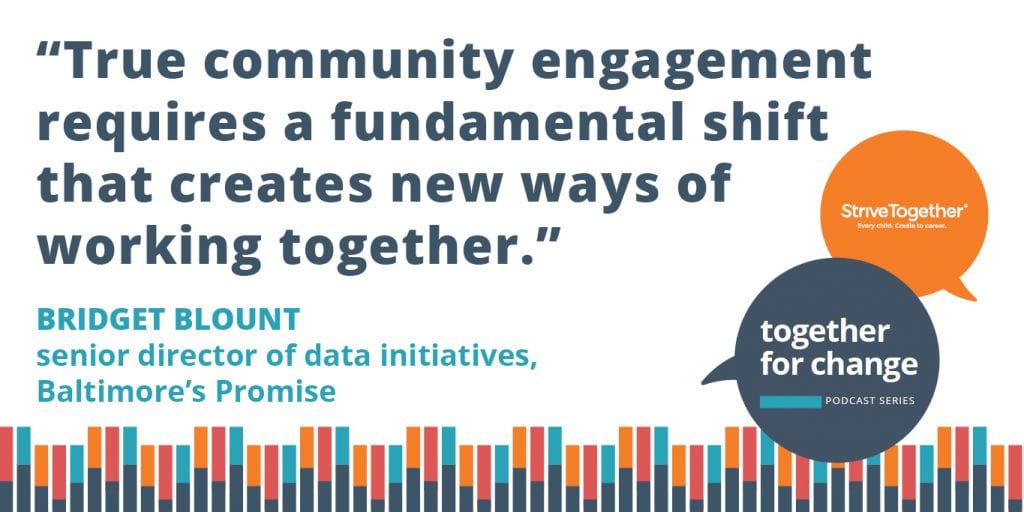
Christian Motley
[35:47] Let’s reduce the number of tables where the young people are the only ones at the table who aren’t getting paid. Thank you, Bridget. Bernadette, what would you say?
Bernadette Merikle
[36:01] Oh, that this could be a whole podcast in and of itself. But I think the main space that I would like people to think about is, I talked a little bit earlier in the podcast around trust. And so a lot of times we talk about the dearth of trust that exists between the communities and those of us that are trying to be in service and in right relationship with the communities.
And we often think about that from a space of like, “Those communities don’t trust us,” when in reality, if we start flipping narratives and changing the way we talk about the work, that changes the way we do the work. So trust is at play, but it’s much more sinister that we don’t trust the communities that we’re in than it is that they don’t trust us, because they have had things done to them forever and eternity.
[36:56] And as we — the way that we get out of doing to community is really being in right relationship and trusting what community already knows. And so it’s things like concretely, when we use words that seem like everybody knows what I’m talking about when I say community, asking the question, “What do you mean by community?” And even a lot of us organizations that are out here to be of service and in service of youth often don’t list youth first, second or even third in that list of who is “community.”
And so, getting in right relationship with community definitely is a matter of the stories we tell, the narratives we believe, and to Bridget’s point, the data that we use to craft those narratives and stories. And so being able to, like, think critically, and think about how we frame what’s happening in the communities we want to serve from spaces of opportunity and spaces of investment in amazing futures, as opposed to, like, we’re fixing this past and we are dealing with problems is a really big, anti-racist stride for many of us in power, who even if we are people of color in power, are often very internalized to doing business in ways that see communities of color as derelict and unknowing.
Christian Motley
[38:25] Thank you, Bernadette. Parv, last word, what would you leave us with?
Parvathi Santhosh-Kumar
[38:31] There is so much wisdom in this room. So really just first appreciating everyone. At StriveTogether, we are all about collaborative improvement. And in that spirit, my first piece of advice is don’t let perfect be the enemy of good. Just get started. I love the metaphor of the garden. Because this work is messy, it’s muddy, accept that you’ll make mistakes along the way, and you’ll learn from them and just keep getting better.
This is a time for urgency and action. But it’s also a time for humility and courage. We have to walk the talk on centering race and community in real and tangible ways. And a powerful step in that direction is truly listening to and trusting youth and families and communities, meeting communities where they are to advance their priorities and interests.
[39:15] So, circling back to the idea that was shared earlier about this requires getting systems ready for the community and not the other way around. Listen to and work with young people, families and residents. Respect, trust and value this lived experience, focus on the challenges of systems and use data and stories, numbers and narrative to mobilize and catalyze action. And fundamentally at the end of the day, it’s about institutionalizing these power shifts so that they’re lasting, so that they’re sustainable and last beyond any changes in people in power.
Christian Motley
[39:50] And that’s a word. I think system leaders, if you are listening, you got work to do. Not the community members, not the young people, not parents and families. We’ve got to value their voice. Thank you, all three of you. Your work is so critical. I’ve been so grateful to have this conversation with you today. Just thank you. Thank you.
Stay connected by visiting us at StriveTogether.org, where you will find transcripts of our Together for Change podcast series.
Listen to more episodes and subscribe >>

